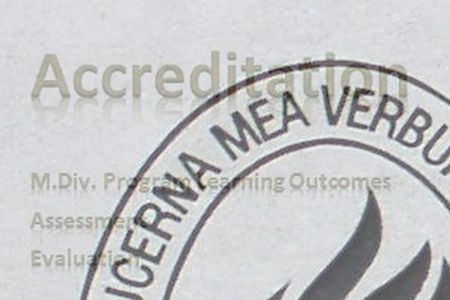
Accreditation
CRTS is accredited by the Commission on Accrediting of the Association of Theological Schools (ATS) in the United States. The Master of Divinity degree is approved by ATS.
The Commission contact information is: The Commission on Accrediting of the Association of Theological Schools in the United States and Canada, 10 Summit Park Drive, Pittsburgh, PA 15275, USA; Telephone: 412-788-6505; Fax: 412-788-6510; Website: www.ats.edu.
Statement of Educational Effectiveness
The primary purpose of the Canadian Reformed Theological Seminary is “to train students to serve as faithful, effective ministers of the gospel” (Statement of Institutional Purpose). More specifically, the goal is that the graduates understand the Word of God competently, communicate it earnestly, and radiate it courageously and compassionately. In order to ascertain and ensure that CRTS is doing this for all of its students, CRTS regularly assesses and aims to improve a number of different aspects of the educational experience at CRTS. The assessment includes input from students and alumni. The list below contains several key indicators that CRTS tracks, including the span of time to which they refer.
Completion Rate - 2019-2024
Percentage of students enrolled in the MDiv program who completed their program: 97% (32/33).
Placement Rate - 2019-2024
Percentage of MDiv graduates who have been ordained in congregations or in mission contexts: 91% (29/32).
Achieving our Program Learning Outcomes (2018/’19-2023/’24)
Each year CRTS steps back and evaluates how effective it is in helping students achieve the MDiv program learning outcomes. The faculty considers a broad cross-section of outcomes, from sermon proposals, research papers, and course marks to input received from mentors who guide students in internship programs, as well as congregational office bearers who participate in worship services led by CRTS’s students. In the last six-year period CRTS has met or exceeded 88% of the learning outcomes.
Listening to our Alumni
Graduates also help CRTS to improve the education offered at CRTS. Every other year CRTS administers a survey to alumni who have graduated a few years prior and asks them to evaluate its programs, especially with a view to how well the instruction they received at CRTS prepared them to serve the Lord and his church in their current calling. When CRTS asked its MDiv alumni in the 2023 survey how effective the seminary was in helping the alumni grow in understanding, communicating, and radiating God’s Word, the students responded as follows:
|
God's Word is central at CRTS. On a scale of one (1) to five (5), where 1 is "very ineffective" and 5 is "very effective", how effective was your seminary education in helping you to grow in the following areas? |
|
|
|
Weighted Score out of 5 |
|
Understanding the Word |
4.57 |
|
Communicating the Word |
3.86 |
|
Radiating the Word by causing you to grow spiritually |
3.29 |
CRTS also asked the MDiv alumni how well their education at CRTS prepared them for their current work using a scale of one to five, and the weighted score of the responses on the 2023 survey was 4.00 out of 5.
CRTS Stance on Diversity
The Canadian Reformed Theological Seminary (CRTS) rejoices in serving the needs of Christians with diverse historical, socio-economic, geographical, ethnic, and cultural backgrounds.
In line with our purpose and Scriptural basis (Statement of Institutional Purpose) CRTS is committed to training students who come from different backgrounds in order that they are equipped to proclaim the promise of the gospel universally and without discrimination to all nations and people to whom God in his good pleasure sends the gospel (cf. Psalm 87:4-6; Isaiah 40:1-5; Matthew 28:19-20; John 3:16; Galatians 3:25-29; Belgic Confession, Article 27; Canons of Dort I, 3; II, 5; III/IV, 7-8).
CRTS seeks to reflect this commitment to diversity by giving special attention to the diverse perspectives of the people from different backgrounds with whom the supporting Reformed churches interact in their ministries. CRTS also upholds this commitment in planning, education and formation of students, adoption of policies, offering student services and implementation of administration.


